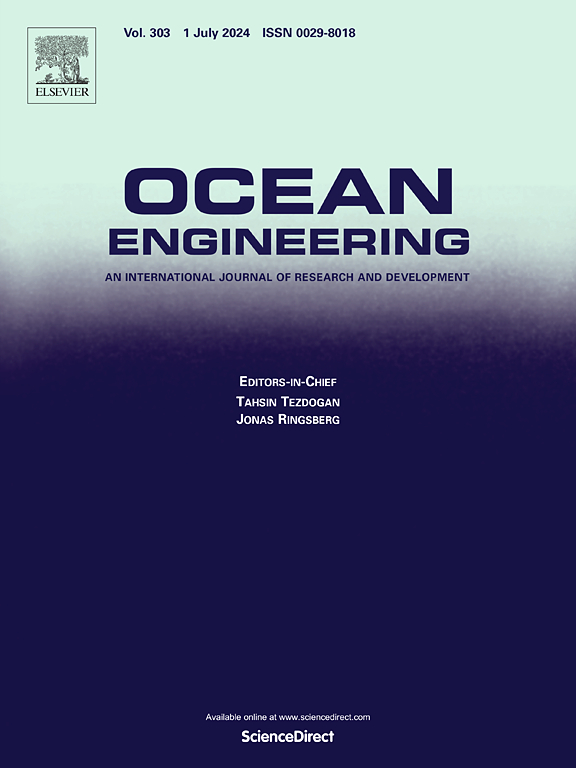Cooperative game method of heterogeneous unmanned surface vehicles based on distributed decision-making framework
IF 4.6
2区 工程技术
Q1 ENGINEERING, CIVIL
引用次数: 0
Abstract
Due to targeted design, unmanned surface vehicles (USVs) with different functions often show significant heterogeneous characteristics. This heterogeneity allows the USV cluster to perform more complex and diverse tasks. This paper innovatively proposes a cooperative game method for a heterogeneous USV cluster based on a distributed decision-making framework, which aims to significantly improve its decision-making quality. Specifically, we first combine the underactuated characteristics of the USV and the actual mission requirements and use the geometric method to accurately calculate the position of the guidance point. On this basis, we introduce the concept of ’neighbor USV’, and construct a distributed decision-making framework based on neighbor USV. The framework further enhances the coordination ability between USVs through a hierarchical decision-making mechanism. In the hierarchical decision-making system, the upper decision-making is mainly responsible for solving the sub-task allocation problem of each USV. The lower decision-making focuses on the specific action strategy of each USV. In order to verify the feasibility and superiority of the proposed method, we carried out Monte Carlo simulation experiments. The experimental results show that this method significantly improves the coordination efficiency and task execution ability of the USV cluster while ensuring real-time decision-making. Through the research of this paper, we provide a new idea for the cooperative control of heterogeneous USV clusters and provide a reference for the broad application of USV clusters in the future complex task environment.
基于分布式决策框架的异构无人水面车辆协同博弈方法
由于设计的针对性,不同功能的无人水面车辆往往表现出明显的异质特征。这种异构性允许USV集群执行更复杂和多样化的任务。本文创新性地提出了一种基于分布式决策框架的异构USV集群合作博弈方法,旨在显著提高其决策质量。具体来说,我们首先结合无人潜航器的欠驱动特性和实际任务需求,利用几何方法精确计算制导点位置。在此基础上,引入“邻居USV”概念,构建基于邻居USV的分布式决策框架。该框架通过层次化的决策机制进一步增强了usv之间的协调能力。在分层决策系统中,上层决策主要负责解决各个USV的子任务分配问题。较低的决策侧重于每个USV的具体行动策略。为了验证所提方法的可行性和优越性,我们进行了蒙特卡罗仿真实验。实验结果表明,该方法在保证决策实时性的同时,显著提高了USV集群的协调效率和任务执行能力。通过本文的研究,为异构USV集群的协同控制提供了新的思路,为USV集群在未来复杂任务环境中的广泛应用提供了参考。
本文章由计算机程序翻译,如有差异,请以英文原文为准。
求助全文
约1分钟内获得全文
求助全文
来源期刊

Ocean Engineering
工程技术-工程:大洋
CiteScore
7.30
自引率
34.00%
发文量
2379
审稿时长
8.1 months
期刊介绍:
Ocean Engineering provides a medium for the publication of original research and development work in the field of ocean engineering. Ocean Engineering seeks papers in the following topics.
 求助内容:
求助内容: 应助结果提醒方式:
应助结果提醒方式:


